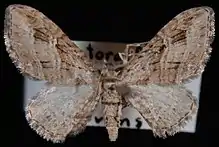Eupithecia niphadophilata
Eupithecia niphadophilata is a moth in the family Geometridae first described by Harrison Gray Dyar Jr. in 1904. It is found in North America from British Columbia and western Alberta south to New Mexico.[3]
| Eupithecia niphadophilata | |
|---|---|
 | |
| Scientific classification | |
| Domain: | Eukaryota |
| Kingdom: | Animalia |
| Phylum: | Arthropoda |
| Class: | Insecta |
| Order: | Lepidoptera |
| Family: | Geometridae |
| Genus: | Eupithecia |
| Species: | E. niphadophilata |
| Binomial name | |
| Eupithecia niphadophilata | |
| Synonyms | |
| |
The wingspan is about 20 mm. Adults are on wing from late July to September.
The larvae feed on Juniperus communis, Juniperus scopulorum and Thuja plicata. Full-grown larvae reach a length of 20 mm. There are two colour morphs. The common form is green with a greenish-yellow head. The second form is brown. Larvae can be found from mid-May to early August and pupation takes place from July to August. The species overwinters as an egg.[4]
References
- Yu, Dicky Sick Ki. "Eupithecia niphadophilata (Dyar 1904)". Home of Ichneumonoidea. Taxapad. Archived from the original on March 24, 2016.
- "910389.00 – 7552 – Eupithecia niphadophilata – (Dyar, 1904)". North American Moth Photographers Group. Mississippi State University. Retrieved May 2, 2019.
- Rindge, Frederick H. (July 25, 1963). "Notes on and descriptions of North American Eupithecia (Lepidoptera, Geometridae)" (PDF). American Museum Novitates (2147): 1–23.
- "Eupithecia niphadophilata (Dyar)". Trees, Insects and Diseases of Canada's Forests. Natural Resources Canada. Retrieved May 2, 2019.
Wikimedia Commons has media related to Eupithecia niphadophilata.
Wikispecies has information related to Eupithecia niphadophilata.
This article is issued from Wikipedia. The text is licensed under Creative Commons - Attribution - Sharealike. Additional terms may apply for the media files.